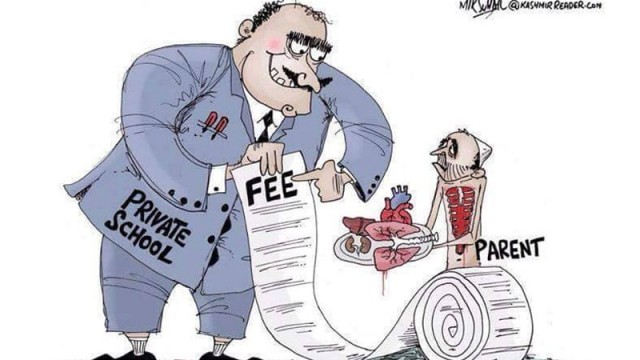Private Schools-Parents-State: The Hate Triangle
Recent events have changed the way a student looks at his/her educational institution. The parent-school tussle does not have a party that is entirely wrong. Strong emotions from frustrated parents paint a devilish picture of these schools, while stubborn and rigid stances and strikes by the schools makes them seem like monarchs from the past. Both extremes are unnecessary, non-productive and harmful to the society in general, and children in specific.
Resting in the centre of this controversy is an amendment to the Punjab Private Institutions (Promotion and Regulation) Ordinance, 1984 whereby Sections 7A, 12A, 12B and 12C were inserted. Said amendment was the government’s way of responding to protests by parents against unreasonable fee hikes made by the private schools, thereby becoming a necessary and proper party to the dispute. A hate triangle was born where parents, private schools and the government stand firmly in their corners.
Section 7A is the core of contention for private schools. It regulates the process for annual increase in fee by the schools. Seen as necessary by the parents and the government, private school owners see it as a gross violation of their fundamental rights, especially the right to free trade and business as enshrined in Article 18 of the Constitution of Pakistan.
What the parents need to acknowledge, and schools need to admit, is that it is a business. Education and health are two of the most profitable businesses in Pakistan today, primarily owing to the state’s failure in the performance of its obligations. There is no doubt that education, even if taken as a business, is still a noble business. But the nobility depends largely on the priorities of those who undertake it.
A common misunderstanding, intentional or for lack of understanding and knowledge, is that parents are protesting against the exorbitant fees being charged by the heavy weights in private schools industry. That is not the case, and if it were it would have been unreasonable. When a parent chooses a school for his/her child, its standards, faculty, campus, results, facilities as well as fee are all taken into consideration. There is a mark difference between an average private school’s standard and those of an established school with high end, state of the art facilities. It would be plain stupid to protest against the makers of Mercedes for not selling their cars for the price of a Toyota, or against Avari Hotel for not renting out rooms at the rate charged by Gammay da hotel. But once the room is rented out, any increase in its rent which prima facie seems unreasonable and puts an unforeseeable burden on the tenant is exploitation, extortion even. So if I had my child admitted in a school with an annual fee of Rs. 50,000/- and am charged Rs. 1,00,000/- two years later, I am bound to feel exploited, extorted and taken advantage of.
While the schools are within their rights to charge what they want, being a private business, they cannot keep making huge annual increase in fees and consequently enlarging the financial burden on parents without just cause.
When the parents were protesting against fee hikes, there were regular remarks made by some private schools whereby not resorting to legal recourse was shunned. Now after the schools themselves have challenged an allegedly unconstitutional amendment before the High Court, how can they justify shutting the schools down in protest? Is it a protest against the amendment passed by the provincial legislature or against the High Court for an order that they haven’t yet passed? If the amendment is actually unconstitutional and violative of their fundamental rights, the best forum to contest is the court. A strike or shutting down can only be taken as a pressure tactic applied to make the protesting parents back off. If so, it will not bode well for their education-before-profits stance.
As for the case itself, true that freedom of trade and business is a fundamental right as enshrined in Article 18, but like all fundamental rights it is not absolute or unconditional, it is a qualified right. The government is within its rights to impose “reasonable” restrictions on any such liberty. Regulating the process on increasing fee, is in my opinion reasonable. A school owner’s fundamental right to freedom of trade is not above, or independent of, a citizen’s fundamental rights.
In the words of honourable Justice Mr. Justice Tassaduq Hussain Jillani;
“The Constitution of a country is an organic whole and the import of a certain provision has to be construed in the context of the overall scheme of the Constitution.”
Therefore while enforcing or safeguarding the freedom of trade, the state cannot ignore Article 38 wherein promotion of social and economic well-being of the people has been declared as one of its primary responsibilities.
Justice Jillani further says;
“By qualifying the right to business and trade, the Constitution makers wanted to create a balance between the societal needs and rights of an individual”
The state has played its due role, it is now a legal battle, let the due process take its course and accept the court’s verdict when it comes. Private school owners should not be portrayed as evil entities, they are within their rights as corporate entities to protect their interests. Parents too, are not engaging in frivolous hate campaign, but are merely safeguarding their economic interests and the future of their children.
As for the news of a strike, in my honest opinion, a strike by the schools at this point will damage their own cause, tarnish their repute and bring undue bad name which demeans their sincere efforts put into bringing quality education within our reach, in the absence of any such provision by the state.
The views expressed in this article are those of the author and do not necessarily represent the views of CourtingTheLaw.com or any organization with which he might be associated.


